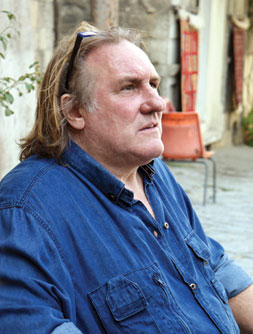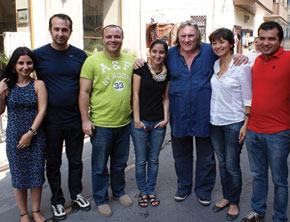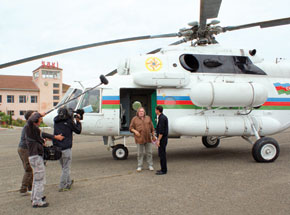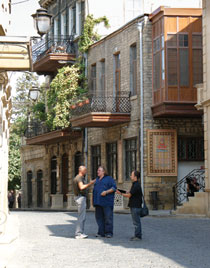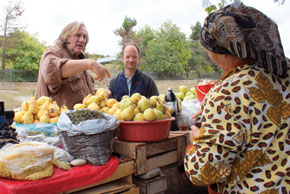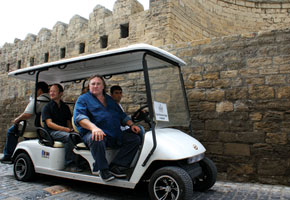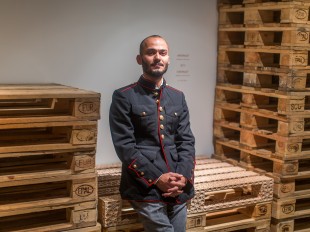One autumn morning the sleepy staff at a guesthouse in the Ismayilli mountain region could hardly believe their eyes – at the old stove in their small kitchen French film star Gérard Depardieu was cooking eggs for breakfast and showing every sign of enjoying himself.
Down-to-earth
It was very early and the staff at the rural guesthouse weren’t used to such a display of activity from their visitors. Hurry up! Let’s get the food on the table… we need to start work, Depardieu said to the shocked staff. As if unaware of their confusion, he was about to wake everyone else for breakfast. But there was no need. The film crew came running at the clang of the pots and pans handled by the lively Gérard. The staff stood and watched in amazement. That morning would be etched in their memories. This is how they remember him – down-to-earth, energetic and sociable.
In the footsteps of Dumas
Gérard Depardieu and his crew were in a hurry to get on with filming a documentary about the tour taken by Alexandre Dumas (père) through Azerbaijan a century ago. In 1858, the author of the swashbuckling Count of Monte Cristo and The Three Musketeers visited the Caucasus. On his nine-month journey he discovered the region’s beauty. Dumas visited the Atashgah, the fire temple located in the outskirts of Baku, and Sheki, Quba and Ismayilli. He even made his way to Sari Bash, one of the highest villages in Azerbaijan.
Dumas recorded his impressions in the book Travels in the Caucasus (Voyage au Caucase), published the following year in Paris. What Dumas most remembered about the Caucasus and Azerbaijan was the people and their hospitality.
He wrote: If you knock on any door in Azerbaijan, or anywhere in the Caucasus, say that you’re a foreigner and have no place to spend the night, the owner of the house will immediately give you his largest room. He and his family will move to the small room.
Moreover, during the week, two weeks or month that you stay in his house he will take care of you and will not let you want for anything.
Driving force
Don’t think that Gérard Depardieu was playing Dumas in this film. He plays himself in the documentary, Return to the Caucasus. He follows Dumas’ route around Azerbaijan, seeking out the experiences and emotions of his fellow countryman.
More stories about Gérard’s 10-day trip came from Javid Imamverdiyev, the Azerbaijani co-producer of the documentary. Azerbaijan’s Yaddash Production organized the shooting in Azerbaijan, while post-production was done by French company B-Tween. The film was directed by Jean-Pierre Devillers and the script written by Stéphane Bergouhnioux. The producer on the Azerbaijani side was Fuad Akhundov.
Javid Imamverdiyev told us that the shooting was very energetic with Gérard the ‘engine’ of the process. He had no trouble getting up early in the morning and making breakfast for all his crew. In a word, this was no prima donna.
He was so communicative that people around us were always drawn in to talking to him. And he liked whatever he saw here in Azerbaijan. I think he fell in love with the Azerbaijani people, their hospitality, as Dumas did ages before. Despite some problems and tiredness during the shooting, Gérard Depardieu kept up his energy levels; that energy infected all of us. That was a really interesting, unforgettable time.
Three times a day in a helicopter
When Dumas was travelling around the Caucasus, of course there were no helicopters or jeeps. The novelist and his artist friend rode or walked together through the mountains and across rivers. In comparison, Gérard and artist friend Mathieu Sapin were luckier. They travelled by car, even by helicopter, sometimes taking to the sky three times in one day. While Dumas’ tour lasted for months, Depardieu’s trip took 10 days. But those 10 days were enough for plenty of fun and impressions!
Depardieu suffered from curiosity in the best meaning of the word. Wherever he went and whoever he met Depardieu was always interested in all the details. He was perfectly comfortable with dirt roads and muddy roadsides, with the homes lacking comforts where we had to spend the night… He found pleasure in everything around him. Especially he liked our cuisine. I remember the first days of shooting when we were looking for small restaurants to have lunch. In mountain villages it is quite difficult to find any European-style cafés. But Gérard didn’t want to eat in that kind of place; he would look for the small, shabby restaurants as he knew that these places had by far the best food.
Azerbaijani souvenir
During filming Gérard Depardieu had a dozen meetings, visited several regions, and talked to lots of people. Co-producer Javid Imamverdiyev thought the actor was getting accustomed to the role of Dumas, even though he was playing himself. He was able to feel Azerbaijani culture and mentality.
This was particularly in evidence when he met young jazz pianist Emil Afrasiyab. He liked Emil’s playing so much that he suggested he write music for the film. Azerbaijani art and music as a whole left an indelible impression. It’s true that nobody gave him the gift of a chess set as Natavan is said to have given Dumas, but Depardieu got his own gift – his impressions.
Azerbaijani poet Kurshidbanu Natavan was a young woman when she met Alexandre Dumas during his Caucasus travels. The French novelist is said to have been charmed by her oriental beauty, literary and artistic talent. As an honoured guest at Natavan’s family home, Dumas was given a chess set after playing chess with his host.
It’s true that Depardieu didn’t play chess with anybody in Azerbaijan. For one thing, he didn’t have the time. But he did manage to do a lot of other things instead. For instance, during the 10-day journey he would stop the car whenever he spied fruit for sale on the wayside. He said the fruit was excellent, compared to what’s available in Europe.
New tour route
Azerbaijan’s Ministry of Culture and Tourism is to certify an Alexandre Dumas in the Caucasus cultural route, in accordance with the criteria of the European Institute of Cultural Routes. Three countries – Azerbaijan, Georgia and Russia – have to be involved in order to obtain the international cultural route certificate. The Council of Europe grants the status of a European Cultural Route to routes that combine the cultural and social values promoted by the council. Its purpose is to attract the attention of travellers to the heritage of the different countries and cultures of Europe as the joint heritage of mankind.
Premiere coming soon
The documentary is expected to premiere this year, probably in early summer, Jahangir Mammadov, the head of the film department at the Ministry of Culture and Tourism, told us. The film has been translated into German and English by Franco-German TV channel ARTE and is now available for distribution.
Depardieu and Dumas have much in common and are apparently very similar. Depardieu is somehow associated with Dumas... In the film he seemed to be playing a modern-day version of Dumas; there was no re-creation of olden times. It was modern reality. I think the film is significant for Azerbaijan. Watching the film and realizing that Dumas travelled around Azerbaijan should attract more tourists from all over the world.
